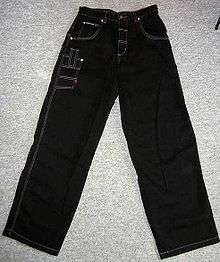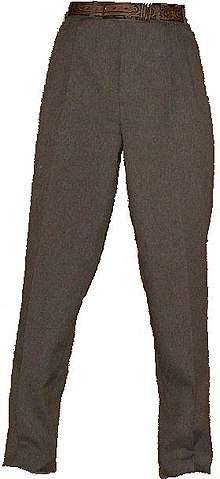trousers
English

Trousers

Trousers
Etymology
Attested since the 1610s, from the earlier form trouzes (attested since the 1580s), extended from trouse (1570s), with plural ending typical of things in pairs, from Middle Irish triubhas (“close-fitting shorts”), of uncertain origin. The unexplained intrusive second -r- is perhaps due to the influence of drawers.[1]
Pronunciation
Noun
trousers pl (plural only)
- An article of clothing that covers the part of the body between the waist and the ankles or knees, and is divided into a separate part for each leg.
- The trousers need to be shortened.
- Why can women wear trousers when men can't wear skirts?
- 1906, Stanley J[ohn] Weyman, chapter I, in Chippinge Borough, New York, N.Y.: McClure, Phillips & Co., OCLC 580270828, page 01:
- It was April 22, 1831, and a young man was walking down Whitehall in the direction of Parliament Street. He wore shepherd's plaid trousers and the swallow-tail coat of the day, with a figured muslin cravat wound about his wide-spread collar.
- 1960, P[elham] G[renville] Wodehouse, chapter XIX, in Jeeves in the Offing, London: Herbert Jenkins, OCLC 1227855:
- The effect the apparition had on me was to make me start violently, and we all know what happens when you start violently while holding a full cup of tea. The contents of mine flew through the air and came to rest on the trousers of Aubrey Upjohn, MA, moistening them to no little extent. Indeed, it would scarcely be distorting the facts to say that he was now not so much wearing trousers as wearing tea. […] “I see you have not changed since you were with me at Malvern House,” he said in an extremely nasty voice, dabbing at the trousers with a handkerchief. […] “Frightfully sorry,” I said. “Too late to be sorry now. A new pair of trousers ruined. It is doubtful if anything can remove the stain of tea from white flannel.”
Usage notes
Synonyms
Hyponyms
- jeans
- pantaloons
- shorts
- slacks
- See also Thesaurus:trousers
Translations
article of clothing for the lower body — see pants
References
- Etymology of trousers in Online Etymology Dictionary
Anagrams
This article is issued from
Wiktionary.
The text is licensed under Creative
Commons - Attribution - Sharealike.
Additional terms may apply for the media files.